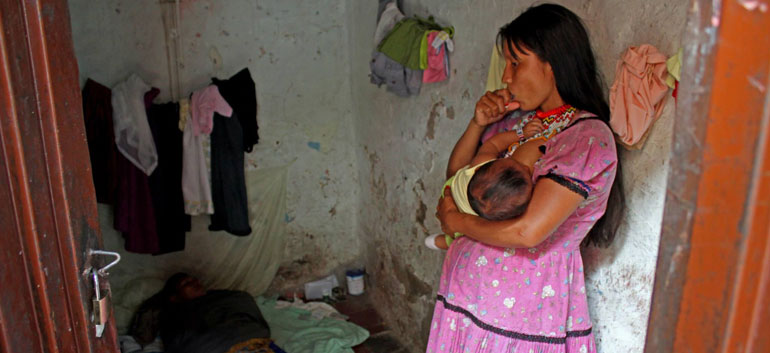The “grave humanitarian crisis” facing western Colombia’s indigenous Embera Katio community has spilled over into the country’s third largest city, according to a report released by the Cali ombudsman on Monday.
Cali’s Emero Katio originate from the Gito Dokabu reserve, in the Pueblo Rico municipality of the western state of Risaralda. The Emera Katio are just one of the many displaced groups that has settled in the state capital Valle del Cauca in recent years.
MORE: Colombia govt vows to return stolen land to indigenous people
These forced migrations have placed a substantial burden upon the city and its social services, contributing to Cali’s rampant gang violence and what the Cali ombudsman previously described as a “total failure of social institutions” in the city. In the case of the Emera Katio, more than 500 families have been displaced from their homelands since 2012. This is reportedly a result of continuing armed conflict and violations of international humanitarian law.
MORE: Cali’s gang violence represents ‘total failure of social institutions’: Cali ombudsman
Sonia Guerrero, a representative of the Ombudsman’s Group for the Defense of Victims, says the community is in a “critical situation”. Some 199 persons, comprising 39 different families, are said to be living in just three houses within Cali’s Calvario neighborhood. In an interview with Colombia Reports, Guerrero explained, “The only real source of work for these people is to be a street seller..and for the women to take their children and beg on the street.” Many of indigenous Cali residents interviewed had not eaten on the day in question, and were accustomed to eating no more than once a day, she said.
Of particular concern to the Ombudsman’s Office, were the living conditions of the children, of which there were 87 under 12 years of age and 19 infants. During the visit, inspectors recorded that a mother had insufficient breast milk to feed her three-month-old baby. Her other son, a child of only two years, was being fed on fizzy soda.
The houses, according to the report, lack beds, mattresses, furniture and adequately hygienic cooking and washing areas, and the residents, accordingly, present with a litany of health problems. One child was said to be recovering from pneumonia, a common illness among the residents. Disease in general spreads quickly through the houses due to overcrowding and poor hygiene.
The Calvario neighborhood where the homes are situated, moreover, “is characterized for being a zone with high levels of insecurity where drug consumption prostitution, and other series of social problems present themselves, affecting [the Embera Kaito] population and obligating them to close their doors at 6pm for security reasons,” according to the Ombudsman’s Office. Guerrero said the community itself is not immune to these surroundings. Drug use has become a problem in some cases, as in that of a woman who, despite lacking proper nutrition, “spends any money she makes on marijuana which she will smoke all day.”
“The government needs to create a situation in which they can tell these displaced groups that this is your land, this is your home, you can relax now,” Guerrero told Colombia Reports, “these people need immediate help.”
The report calls for special protections to be made available to the Embera Katio due to their status as victims of forced displacement. The Ombudsman’s Office asks bodies such as the Ministry of Social Welfare and the Colombian Institute of Family Welfare to intervene to mitigate the conditions experienced by this community and create a regional control authority to oversee the work.
MORE: Colombia halts mining multinationals in indigenous territory
Using the Colombian government’s program of land restitution to people displaced by armed conflict, the Cali ombudsman had previously attempted to return 127 members of the Embera Katio community to their original lands in Pueblo Rico. One year later, most of the families in question had returned, citing a lack of security guarantees and continued violations of their human rights by armed groups acting in the area with impunity.


